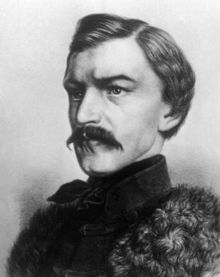Karel Havlíček Borovský
| Karel Havlíček Borovský | |
|---|---|

Karel Havlíček Borovský
|
|
| Born | Karel Havlíček 31 October 1821 Borová, Bohemia, Austrian Empire |
| Died | 29 July 1856 (aged 34) Prague, Bohemia, Austrian Empire |
| Occupation | Writer, journalist |
| Nationality | Czech |
| Alma mater | Gymnasium in Německý Brod |
| Genre | Literary realism |
| Notable works |
Obrazy z Rus Epigramy Duch Národních novin Epištoly kutnohorské Tyrolské elegie Král Lávra (poem) Křest svatého Vladimíra |
Karel Havlíček Borovský (Czech pronunciation: [ˈkarɛl ˈɦavliːtʃɛk ˈborofskiː]; Borová, today Havlíčkova Borová; 31 October 1821 – 29 July 1856) was a Czech writer, poet, critic, politician, journalist, and publisher.
He lived and studied at the Gymnasium in Německý Brod (today Havlíčkův Brod), and his house on the main square is today the Havlíček Museum. In 1838 he moved to Prague to study philosophy at Charles University and, influenced by the revolutionary atmosphere before the Revolutions of 1848, decided on the objective of becoming a patriotic writer. He devoted himself to studying Czech and literature. After graduating he began studying theology because he thought the best way to serve the nation would be as a priest. He was expelled after one year for "showing too little indication for spiritual ministry".
After failing to find a teacher's job in Bohemia, he left for Moscow to work as a tutor in a Russian teacher's family: with a recommendation by Pavel Josef Šafařík. He became a Russophile and a Pan-Slav, but after recognizing the true reality of the Russian society he took the pessimistic view that "Pan-Slavism is a great, attractive but feckless idea". His memories of the Russian stay were published first in magazines and then as a book Obrazy z Rus (Pictures from Russia).
He returned to Bohemia in 1844, aged 24 and used his writing skills to criticize the fashion of embracing anything written in the recently reborn Czech language. He specifically aimed at a novel by Josef Kajetán Tyl. In 1846 Havlíček attained a position as editor of the Pražské noviny newspaper with the help of František Palacký.
...
Wikipedia
